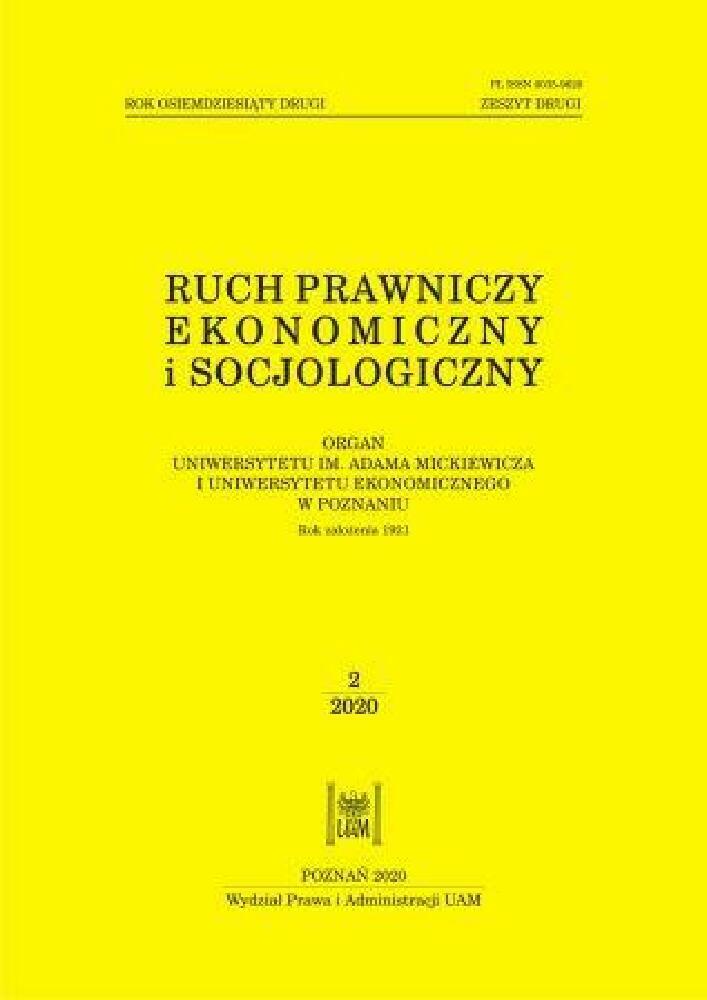Abstract
This article is devoted to the right to respect for religious feelings, which is a derivative of freedom of religion. In the light of the case-law of the European Court of Human Rights in Strasbourg, the protection of religious feelings constitutes a value that justifies the restriction of freedom of speech. The law protects the feelings of believers primarily from statements that are gratuitously offensive. The concept of gratuitous offensiveness is interpreted relatively narrowly, and therefore expressions that are shocking, controversial, critical of religion or questioning dogmas, are fully allowed and within the limits of freedom of speech. The most appropriate form of protection of religious feelings are civil law sanctions, while criminal sanctions should apply only as a last resort in the case of statements calling for violence or leading to a serious disturbance of public order.
References
Bychawska-Siniarska D. (2017). Protecting the Right to Freedom of Expression under the European Convention on Human Rights. A Handbook for Legal Practitioners. Council of Europe.
Clooney A., Webb, P. (2017). The right to insult in international law. Columbia Human Rights Law Review 48(2): 1–55.
Dijk P. van, Hoof, F. van, Rijn, A. van, Zwaak, L. (2018). Theory and Practice of the European Convention on Human Rights. Cambridge–Antwerp–Portland.
Evans, C. (2001). Freedom of Religion under the European Convention on Human Rights. Oxford.
Frowein, J., Peukert, W. (1996). Europäische Menschenrechtskonvention. EMRK-Kommentar. Kehl am Rhein.
Garlicki L., Hofmański, P., Wróbel, A. (2010). Konwencja o Ochronie Praw Człowieka i Podstawowych Wolności. Komentarz do artykułów 1–18. Tom 1: Komentarz. Wersja elektroniczna Legalis. Warszawa: uwaga z nb. 7 do art. 10, uwaga z nb. 21 do art. 9.
Hucał, M. (2012). Wolność sumienia i wyznania w orzecznictwie Europejskiego Trybunału Praw Człowieka. Warszawa.
Letsas, G. (2012). Is there a right not to be offended in one’s religious beliefs? [w:] L. Zucca (ed.), Law, State and Religion in the New Europe Debates and Dilemmas. Cambridge: 239–260.
Meyer-Ladewig, J., Nettesheim, M., Raumer, S. von (2017). EMRK – Europäische Menschenrechtskonvention. Handkommentar. Basel.
Milanovic, M. (2018). Legitimizing blasphemy laws through the backdoor: the European Court’s judgment in E.S. v. Austria. Blog of the European Journal of International Law, 29.10.2018, <https://www.ejiltalk.org/legitimizing-blasphemy-laws-through-the-backdoor-the-european-courts-judgment-in-e-s-v-austria/> [dostęp: 5.02.2020].
Nowińska, E. (2007). Wolność wypowiedzi prasowej. Warszawa.
Peers, S. (2018). Freedom to insult? Balancing freedom of expression with religious tolerance in ECHR case law. EU Law Analysis Blog, 19.12.2018. <http://eulawanalysis.blogspot.com/2018/10/freedom-to-insult-balancing-freedom-of.html> [dostęp: 5.02.2020].
Sobczak, W. (2013). Wolność myśli, sumienia i religii. Poszukiwanie standardu europejskiego. Toruń.
Schabas, W.A. (2015). The European Convention on Human Rights: A Commentary. Oxford.
Skrzydło, J. (2013). Wolność słowa w orzecznictwie Sądu Najwyższego Stanów Zjednoczonych i Europejskiego Trybunału Praw Człowieka: analiza porównawcza. Toruń.
Smet, S. (2018). E.S. v. Austria: freedom of expression versus religious feelings, the sequel. Strasbourg Observers, 7.11.2018. <https://strasbourgobservers.com/2018/11/07/e-s-v-austria-freedom-of-expression-versus-religious-feelings-the-sequel/> [dostęp: 5.02.2020].
Sobczak, J. (2001). Radiofonia i telewizja. Komentarz. Wersja elektroniczna Lex: uwaga nr 6 do art. 18.
Uitz, R. (2007). Freedom of Religion in European Constitutional and International Case Law. Strasburg.
Wacławczyk, W. (2009). Wolność słowa: wybrane zagadnienia. Toruń.
Warchałowski, K. (2004). Prawo do wolności myśli, sumienia i religii w Europejskiej Konwencji Praw Człowieka i Podstawowych Wolności. Lublin.
License
Copyright (c) 2020 WPiA UAM

This work is licensed under a Creative Commons Attribution-NonCommercial-NoDerivatives 4.0 International License.





